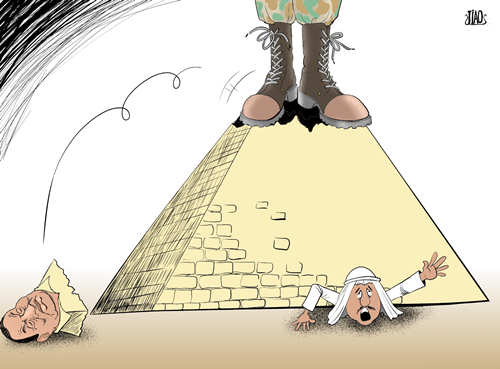The implications of the Egyptian election
- By Patrick Byrne
 0 Comment(s)
0 Comment(s) Print
Print E-mail
China.org.cn, December 8, 2011
E-mail
China.org.cn, December 8, 2011
|
|
|
The pot and the kettle [By Jiao Haiyang/China.org.cn] |
With the results coming in from Egypt's first round of multi-stage elections, it seems clear that there has been a reasonably high turnout in which the Muslim Brotherhood has emerged as the single largest party. This is the latest development in a year-long movement for democracy that began in Tunisia and has spread across many Arab states.
The problem is that unlike in Tunisia, the elections in Egypt are not for a constitutional assembly to decide on the shape of the new constitution, the traditional process for replacing an autocracy with a representative democracy. Instead, Egyptians are electing a parliament whose powers are unclear and form part of a process decided solely by the Supreme Council of Armed Forces under the command of Field Marshal Hussein Tantawi, the former defence minister of the toppled ruler, Hosni Mubarak. This lack of democratic legitimacy for the new democratic system is at the root of the continuing conflict in Egypt and the mass protests and killings that took place last week. Nevertheless, most Egyptians see these elections as a major step forward and that the parliamentary outcome even with limited powers will help the transition from military rule to democracy.
Certainly this is the hope of the Islamic Brotherhood's Freedom and Justice Party. Like the recently successful moderate islamic parties in Tunisia and Morocco, the Egyptian islamists have learned from the experience of the moderate muslim Justice and Development Party (AKP) which has ruled Turkey for the last decade. The AKP emerged out of a split in the Turkish islamic movement after they were forced from power by the Turkish army in 1997. A section of the Turkish islamists realised that the road of religious radicalism could not succeed and opted for a patient and pragmatic approach involving compromises with the existing non-religious institutions such as the army, business, the secular state, the European Union and the United States. This strategy has paid off handsomely for the Turkish islamists who have presided over a sustained economic boom that has turned Turkey into a major regional power, while simultaneously being able to reduce the role of the old establishment and the army.
The gains of the Turkish Islamic movement are clearly seen as a model for those Arab states which have removed their dictators and are looking for a way towards stable representative democracy and economic success. But with definite limitations. For example, when representatives of the Turkish AKP recently visited the Islamic Brotherhood in Egypt and advised them to create a secular, non-religious state, they were rebuffed. The Islamic Brotherhood made it clear that it wanted the special status of Islam to be continued in the constitution and for Islamic (Sharia) law to play a large part in the life of the new Egypt. Such policies could lead to further sectarian infighting with the large Christian minority, ugly examples of which we have already seen in the last six months.
There is also the difficult problem of the Egyptian army's future role in the country. The army is said to account for 40% of the Egyptian economy and is naturally resistant to any reduction of its power and privileges.
Such issues could have been faced up to and tackled in a democratic constituent assembly but are unlikely to be satisfactorily resolved in the fractured parliamentary/presidential system now being imposed by the Armed Forces.
Another possible problem with the Turkish model is that it mainly based on the neo-liberal economic agenda. Central to this agenda is the need to attract foreign direct investment through privatisation and the reduction of taxes and other restrictions on business and the wealthy. From experience elsewhere, such a strategy could lead to a further increase in the gap between rich and poor, as well as corruption in public life, two issues that contributed to the mass discontent and popular uprisings of the last year.
Another key issue in Egypt is unemployment especially among the young. Here too, prospects are bleak with a world economy that appears to be entering another recession which the Chinese Vice Premier Wang Qishan recently described as worse than 2008. Such difficulties may place serious stress on the inspiring political process released by the Arab Spring.
Patrick Byrne is an Irish journalist based In Turkey. He can be reached at patbyrneme@gmail.com






